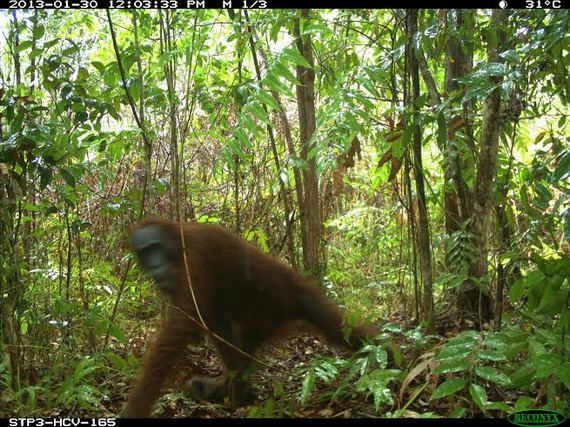Did you hear that the sloth bear was officially declared as extinct in Bangladesh last week?
The news came around the same time that the World Wildlife Fund issued its new report on the status of biodiversity on planet earth. Not surprisingly, the report pegged the loss of biodiversity at 50% from 1970 to 2010. We're talking about losing half the earth's biodiversity in forty years.
A UN conference held in Korea further warned that the biodiversity goals set in 2010 through the Aichi Biodiversity Targets are not being met. The Aichi Targets called for halving the loss of habitats but that is now being seen as inadequate to prevent the extinction of many species.
Meanwhile, out of New York city, a new agreement to continue deforestation was announced with much fanfare. Countries like Peru and Liberia scored big loot bags with promises of funding to protect their forests but the one announcement that bugged me most was the talk of restoring 150 million hectares of degraded lands while accepting the loss of half of earth's forests.
Isn't that completely working ass backwards?
Wouldn't it make more sense to use the 150 million hectares of degraded lands for agriculture and save its equivalent of pristine forests? Think about it, what works better for biodiversity? An acre of old forest or an acre of newly planted "forest?"
So why celebrate the rate of deforestation announced in the New York Declaration? Can we not put our inherent human greed to good use and demand that we do better than this?
Grand statements coming out of fancy conferences in concrete jungles are dangerous in that they create an illusion that things will get better. It's so much easier to make positive statements when everyone around you is doing the same but can they execute once they go home? Take for example Indonesia, which made this statement at the Climate Summit.
It is to this end that the Government of Indonesia, in partnership with UNDP, is establishing a National Platform for Sustainable Palm Oil. The platform aims to ensure that plantations are developed in non-conservation areas and will support 3 million smallholders across Indonesia
Will this new government stance stand up against corporate powerhouses in Indonesia's palm oil and timber businesses that are already out protesting against new land use rules?
What about the free falling population of orangutans in Indonesia? The Sunda pangolin whose rating by the IUCN has just been upgraded to Critically Endangered? The iconic hornbill of SE Asia being pushed to the edge of extinction due to a loss of habitat? Will the few hundred Malayan tigers left survive to the year 2020 in the wild or will they join the sloth bear in extinction?
If we let ourselves be lulled into a false sense of security by these big money statements that seem to be telling us that it's OK to give up on half the forests standing today, there is a real chance that those species will become another file in the continued failure of the Aichi Targets. I do not argue the rights of countries to development as I'm sure their citizens would like comfort features like electricity at the flick of a switch but the New York Declaration on Forests sounds to me like the party organizers had good spin doctors that sold a half empty cup as half full.
Endangered fauna and flora do not have time. These Nobel Laureates understand that better.
We are poised to do more damage to the Earth in the next 35 years than we have done in the last 1,000.
Rather than celebrate announcements with targets set for 2020, I celebrate announcements like the one Cargill made recently when they adopted a "no deforestation" policy.
What's the big deal with palm oil companies and conservation? Let's take for example, an established conservation area in Indonesia that is home to orangutans, Sun bears, gibbons and the rare and endangered Storm's stork. In a different conservation area in north Borneo, another plantation run project is showing some great results for the endangered banteng which is not only surviving in the area but is thriving! These are happening right in the middle of palm oil plantations!
Palm oil plantations may have been a key reason for the loss of habitats which is bringing about the threat of wildlife extinctions but these are new times. One palm oil grower which faced accusations of removing precious habitat has now completed re-assessments of its plantations to deal with those accusations and is now working on conservation plans for 13,000 hectares.
Others like the Malaysian Palm Oil Association are working on recovering vital wildlife habitat in northern Borneo. If they are successful, we could see a truly vital habitat for elephants, orangutans and every other wild animal that calls north Borneo home.
This is a role that most palm oil companies I've spoken to are uncomfortable with as any conservation efforts attempted by them have been slapped with a green-wash label. Plantation owners have to get over this and realise that while their critics maybe good at pointing out problems, these same critics offer no realistic solutions.
Until we know what the fall-out from the agreement to continue deforestation is, these little pockets of survivors are an essential solution to stopping absolute extinction.
